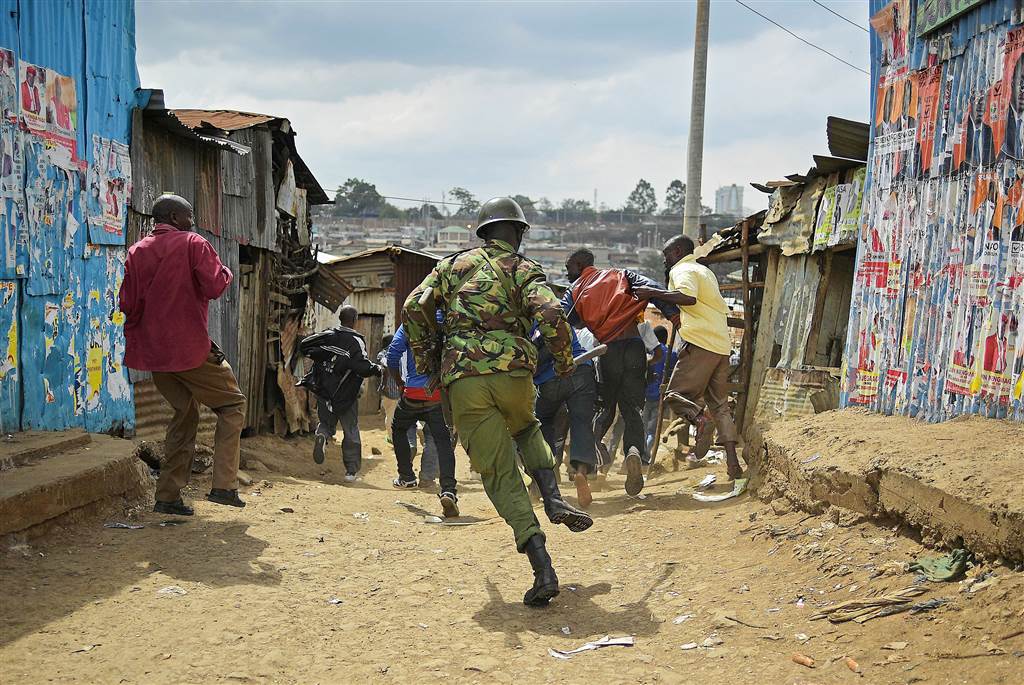Opposition protests that erupted after the election victory of Kenyan President Uhuru Kenyatta have turned violent in the African country, with three people killed on Saturday.
The latest deaths mean nine people have been killed in election-related violence since Tuesday.
The second day of the demonstrations saw running battles with police in isolated parts of Nairobi slums after anger against Tuesday’s election that losing candidate Raila Odinga claims was massively rigged.
Interior Minister Fred Matiangi blamed the unrest on “criminal elements” looting and robbing businesses and assured Kenyans that “there is no need for alarm”, urging them to return to their daily lives.
The uncertainty gripping the nation provided a grim reminder of a disputed 2007 election which led to two months of ethno-political violence that left 1,100 dead and 600,000 displaced.
Kenyatta was declared the victor in the presidential election Friday night with 54.27 percent to Odinga’s 44.74, with protests erupting in the opposition leader’s strongholds in Nairobi and the western city of Kisumu almost immediately.
Foreign observers praised a peaceful, credible voting process — which saw turnout of 78 percent — but the mood quickly turned sour when Odinga rejected the results after only a few hours of counting earlier this week.
The main opposition coalition, the National Super Alliance (NASA), has claimed both that the outcome was manipulated by a massive hacking attack, and that it is in possession of results being concealed on IEBC servers that show Odinga to be the rightful winner.
Local government official Wilson Njega confirmed one person had been shot dead outside Kisumu in protests, while an AFP reporter saw three patients with gunshot wounds in the city’s hospital. Five other people were wounded in gunfire.
At the hospital Truphena Achieng said his brother had been shot and injured “and yet he was just standing outside our house where people were demonstrating … we don’t know why police were shooting.”
In the southwestern town of Siaya, a police officer speaking on condition of anonymity said a man had been shot dead in a demonstration, but “we have not managed to collect the body… because of resistance from protesters.”
In Mathare, Wycliff Mokaya told The Associated Press his 9-year-old daughter was killed by a stray bullet while on their third-floor balcony.
“I was watching her play with her friends when she suddenly fell down,” Mokaya said. “She was my only hope.”
Matiangi denied there had been any casualties, and said police had clamped down on “erratic incidents of lawlessness,” adding the government would stop at nothing to protect citizens.
“The police have not used live bullets on any peaceful protesters,” he said.
Human Rights Watch on Saturday urged police to show restraint.
“With growing reports of demonstrations and heavy gunfire in some areas, it is important for security forces to work to deescalate – not escalate – the violence,” said Otsieno Namwaya, Africa researcher at HRW.
“The police should not use tear gas or live ammunition simply because they consider a gathering unlawful.”
Odinga, 72, is a veteran opposition politician seen as having taken his last shot at the presidency, which he has sought four times. He believes elections in 2007, 2013 and now 2017 were snatched away from him.
Politics in Kenya is largely divided along tribal lines, and the winner-takes-all nature of elections has long stoked communal tensions.
Odinga’s ethnic Luo supporters — and their allies from other groups — believe they have been denied political power by elites from the Kikuyus, the same ethnic group as Kenyatta, the country’s biggest community.
“President Kenyatta, unlike his first term, must include everyone in his government,” wrote the Daily Nation in an editorial, warning that limiting power to his tribal allies was “exacerbating exclusion and creating resentment and disillusionment.”
In his acceptance speech Kenyatta urged Odinga and his supporters, to “work together… so that we can build this nation together”.
